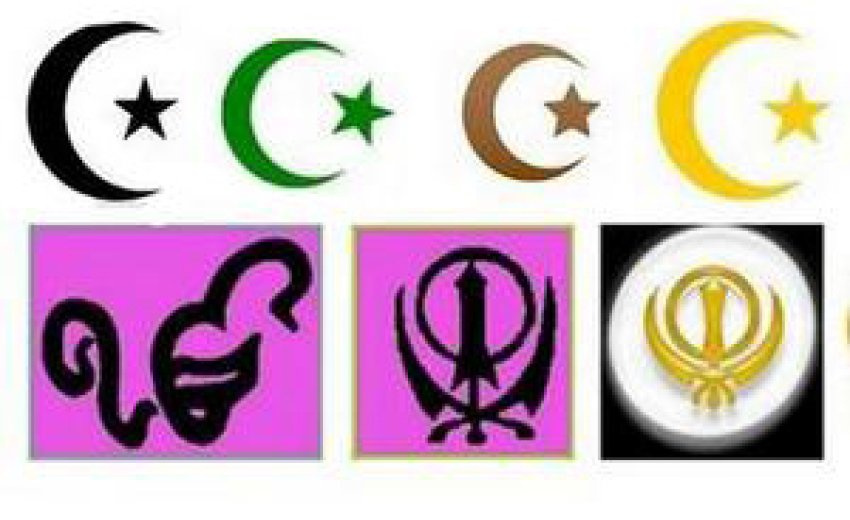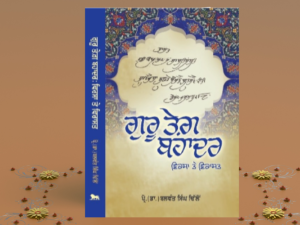Sikh Religion and Islam: Interfaith Dialogue

Introduction:
Sikhism, as one of the youngest religions in the world, was born in
Punjab (India) and Guru Nanak was the founder of Sikh religion. Islam
was born as a new faith in Arabia during the 7th Century and Prophet
Muhammad was its founder. Guru Nanak realised the suffering of Indian
people under the yoke of dual oppression by Brahmanic and Islamic
priestly classes on the one hand and the contemporary rulers, on the
other. Guru Nanak refers to the state of affairs in his compositions
recorded in Sri Guru Granth Sahib (SGGS) as follows1: "Rajas were
ruthless like tigers and the priestly judges were like dogs, and their
officials swooped down on people regardless of whether they were
sitting or sleeping (i.e., at any time of the day).
rwjy sIh mukdm kuqy] jwie jgwiein bYTy suqy]
Prophet Muhammad found the Arabian people divided into hundreds of
tribes engaged in internecine warfare. The people were superstitious
and believed in idol worship, magic, astrology and cult practices.
Gambling and drinking were very common and taking revenge was
considered a religious duty. Slavery was common and female child was
killed or buried alive. There was hardly any literacy among the Arabs.
Sikhism and Islam, though separated widely in both time and space, have many common features and similarities2. A comparison of texts of SGGS and the holy Quran will reveal many points of similarity and some other issues on which both religions also differ. The aim of this essay is not to establish the superiority of one over the other but to provide a common platform for an inter-faith dialogue between Sikh religion and Islam. For example, both religions believe in the Oneness of God and are against idol worship in any form. Belief in the will of God, meditation on the Name of the God and congregational prayer are central to both religions. The caste system in the society is rejected by both and all human beings are considered equal in the eyes of God and Prophet. Spiritual and temporal attainments are considered as sacred goals for upliftment of society in both the religions.
Inter " faith dialogue3 does not mean encounter among variant religious traditions but is a sort of interaction confined not only to religious issues but also pertaining to social and cultural problems. This type of dialogue issues forth in a spirit of fellowship and recognizes the whole in each part. Inter-faith dialogue does not mean denial of the identity of individual traditions through a synthesis of different approaches. The cosmopolitan vision of Guru Nanak is also evident in his inter-faith dialogues with the different religious traditions of his time. Guru Nanak, no doubt, offered a critical analysis of the contemporary religious thought and rejected their external paraphernalia but only to inculcate in them a spirit of deeper penetration in their own religion. The aim of interfaith dialogue in his hymns in SGGS is neither subjugation, nor domination, nor conversion, nor degradation of other traditions but to make them visualize the kernel of truth and implement it in their lives for spiritual transformation4-5:
The real Brahman is only he who practices austerity, contemplation,
charitable and beneficent."
so bRwhmxu jo ibMdY bRhmu] jpu qpu sMjmu kmwvY krmu]
sIl sMqoK kw rKY Drmu] bMDn qoVY hovY mukqu]
soeI bRwhmxu pUjx jugqu]
KqRI so ju krmw kw sUru] pMun dwn kw kry srIru]
Kyqu pCwxY bIjY dwnu] so KqRI drgh prvwxu]
"A true Muslim is he who makes mercy as his mosque, faith as prayer
mat, honest living as Quran, humility as circumcision and good conduct
as fast".
imhr msIiq isdku muslw hku hlwlu kurwxu]
srm suMniq sIlu rojw hohu muslmwxu]
Concept of God
The concept of God has much in common in both Sikhism and Islam. God is considered omnipotent, omniscient, creator of universe and unborn in both religions. Guru Nanak defined God in the opening verse6 (mulmantar) of SGGS as follows:
Ik Onkar (God is One), Sat Nam (His name is True), Karta Purkh (He is
the Creator), Nirbhau (He is without fear), Nirvair (He is without
enmity), Akal Murat (He is timeless Being), Ajoni (He is beyond births
and deaths), Saibhang (He is self created), Gurprasad (He is realized
by the grace of the Guru).
<> siqnwmu krqw purKu inrBau inrvYr Akwl mUriq AjUnI sYBM gurpRswid]
The oneness of God is repeatedly stressed in SGGS by all the Sikh Gurus7-9:
"My Lord is One, One and the only One O Brother"
swihbu myrw eyko hY] eyko hY BweI eyko hY]
"Age after age, you are the One.
Forever and ever, You are the One.
You never change, O creator Lord".
qMU jugu jugu eyko sdw sdw qMU eyko jI qMU inhclu krqw soeI]
"The One Lord permeates all.
The One Lord is pervading everywhere."
sB mih ieku vrqdw eyko rihAw smwie]
Sikh religion is very liberal in calling God by various names selected both from Hindu and Muslim traditions; for example, Hari, Ram, Allah and Khuda. Guru Gobind Singh10 refers to naming of God in one of his verses: "Who can say all His Names"
He is described only by those of His qualities, Which are manifest through His creation." qv srb nwm kQY kvn
krm nwm brnq sumq]
God is considered "Nirvair" in Sikh religion, which means He is inimical to none. In Islam, God is merciful to the believers only and
cruel to the infidels (Kafirs). However, Oneness of God is the cardinal principle in Islam11:
"There is no God but God"
La Ilaha, ill-Allah
Sikhism believes in One God who is both Transcendent and Immanent. He is manifested in this universe through His creation. Oneness of God is common aspect of both Sikhism and Islam.
God is not involved in cycle of birth and death and is beyond the confines of space and time. He is a self-created Being. This idea is
common to both Sikhism and Islam. Holy Quran12 records this quality as follows:
"He is neither the begetter nor the begotten. All things are mortal except Him".Lam yalid wa Lam yoolad,
In SGGS13, this aspect is highlighted in many verses as follows:
"God is devoid of birth and death"
jnm mrx qy rhq nwrwiex ]
"God is without parents, progeny and wife"
nw iqsu mwq ipqw suq bMDp nw iqsu kwm n nwrI]
"You are Lord of all and need not enter the womb".
qMU pwrbRhm prmysru join n AwvhI]
God is Omniscient and this similarity is found in the verses of Holy Quran14 and SGGS15:
Quran:
"Even if thou speakest aloud, He knows the secret thought and that which is yet more hidden".
SGGS: "He himself knows, He Himself acts and sets things right".
Awpy jwxY kry Awip Awpy AwxY rwis]
Creation of the Universe
A comparison of cosmological ideas in SGGS and Quran is already given in the Chapter, "Cosmological Ideas in Science and Religion". We need not repeat all those ideas here. Islamic theory of creation is almost identical to the one given as Genesis in the holy Bible. The Sikh cosmology is more scientific in its approach but leaves the act of creation in the hands of God as the Creator (Karta Purakh). Islam also accepts the ideas and role of God as the creator.
Concept of Salvation, Heaven and Hell
Life and death are two concrete realities and both Sikhism and Islam
deal with salvation, a riddance from the cycle of birth and death, in
their own way following the Oriental and Occidental traditions,
respectively. Sikhism is a life-affirming religion and advances the
hypothesis of liberation during this life itself (Jeevan Mukti). Death
need not be a painful experience for a Guru-oriented (gurmukh) person,
rather a blessing in disguise. The ego-oriented (manmukh) suffers the
pangs of death.
Bhagat Kabir16 illustrates the Sikh view-point in SGGS
as follows:
"Kabir, death, which frightens the world, is the harbinger of bliss for me.
Because it is after death, I will meet my God."
kbIr ijsu mrny qy jgu frY myrY min AwnMdu]
mrny hIqy pweIAY pUrnu prmwnMdu]
Heaven and hell do find a mention in SGGS but the concept of Doomsday is ignored. Sikh religion does not attach too much importance to the disposal of a dead body. It can be cremated or disposed of in a running stream of water. However, the Muslims bury their dead and consider the act of cremation as a sacrilege. Like Christianity, Islam believes in Doomsday, when the dead will rise again from the graves17:"And because the hour will come, there is no doubt thereof, and because Allah will raise those who are in the graves."
Muslims believe that there is eternal life or eternal damnation after death. On the Doomsday, the day of the last Judgement, Prophet Muhammad will intercede on behalf of the Muslims. He will deliver the God-fearing into heaven (jannat) and the wrong " doers into hell (dozakh). Those who enter heaven will live in beautiful gardens surrounded by rivers of milk and honey. They will enjoy company of women of exquisite beauty (hooran). The depiction of hell is like an inferno, horrible to describe here in greater detail.
Ethics and Morality
Perhaps, Islam is the only religion where moral laws are part and parcel of its holy book, the Quran. Islamic code consists of sharia and fiqah; sharia deals with moral code of conduct and fiqah is the science of jurisprudence (Islamic law). Some of the Islamic nations follow the moral code of conduct in letter and spirit in running the affairs of their government but the others follow it partially. Prophet Muhammad wanted to implement the moral code of conduct in Muslim society to keep it on right track. Some of the clauses of fiqah look quite harsh in face of modern jurisprudence. For example, adultery is punishable by death and theft18 by cutting of hands:
"As for the thief, both male and female cut off their hands. It is the reward of their own deeds and exemplary punishment from Allah."
There is no such rigid code of conduct prescribed in the SGGS.
However, to regulate the religious affairs of the Sikh society, SGPC
(the Sikh religious body) adopted rehat maryada (code of conduct),
which is quite flexible compared to the sharia of Islam. Jurisprudence
and administration of justice is left to the local courts and not to
the religious authority in Sikhism. The reason for this approach may
be attributed to the concept of evil and sin in Sikh religion and
Islam. Evil is personified by Satan in Islam19:
"We assign unto him a devil who would be his mate", while Sikhism does not accept the existence of any anti-God entity.
In Sikhism, evil results from the imbalance between worldly and spiritual pursuits. SGGS advocates a truthful conduct20, a balanced
approach in life and prayer to God to avoid falling a prey to the evil:
schu ErY sB ko aupir scu Awcwru]
The division into saints and sinners is justified by their actions during the life. "To err is human" is the acceptable norm in Sikh religion. Only God is perfect; all human beings are liable to commit mistakes21:
All are apt to make mistakes only God (the Creator) is infallible.
Bulx AMdir sBu ko ABulu gurU krqwru]
All things created are susceptible to error, Only the Creator errs not.
Bulx ivc kIAw sBu koeI krqw Awip n BulY]
Sikhism and Islam both support the family life of its adherents; with
due respect for parents and elders. However, there is a wide gap in
both religions so far as respect of women is concerned. In Sikh
religion, the status of women is equal to men in all respects and
numerous verses in SGGS glorify the role of women in society22:
so ikau mMdw AwKIAY ijqu jMmih rwjwn]
Islam assigns different roles and responsibilities for men and women.
Polygamy is permissible and allows upto four women in Islam. Muslim
women are required to keep their bodies fully covered wearing a Burqa
or Hijab. They are not allowed to join their men folk in prayers
conducted in the mosque. Their status is almost equal to slaves23:
"Men are in charge of women because Allah hath made the one to excel
the other".
Charity is highly recommended in both religions. Sikh Gurus commended the contribution of tith (daswandh, equal to ten percent of income) for the promotion of social and spiritual upliftment of the society. SGGS lays stress on honest earning and sharing the fruits of labour even for spiritual emancipation of the individual24:
"He who earns his livelihood by honest means, and shares it with others, has found the true path".
Gwil Kwie ikCu hQhu dyie] nwnk rwhu pCwxih syie]
Prophet Muhammad recommends charity as a great virtue in Islam: "Even half a date-fruit given in charity can save a person from hell-fire". Charity is collected in the form of Zakat by the government and it is responsible for its distribution among deserving poor people of the country.
After discussion of common aspects of both religions, we may refer to some minor points of difference in their creeds. Slavery is permitted in Islam but it is not condoned in any form in Sikh religion. Islam does not approve of music and dancing and considers both as haram(forbidden). However, the Sikh scripture is written in poetry andragas and its congregational singing (Keertan) is considered the best form of worship in Sikh religion25:
In this Dark Age of Kali Yuga, Singing of Lord's praises (Keertan) is the Most sublime and exalted mode of meditation.
kljug mih kIrqnu prDwnw]
gurmuiK jpIAY lwie iDAwnw]
---------------------------------
REFERENCES:
1.SGGS, M.1, p. 1288
2.G.S. Sidhu and Gurmukh Singh, Sikh Religion and Islam: A Comparative Study. Sri Guru Singh Sabha, Hounslow, London, 2001 (Author has made liberal use of this reference material for writing this essay).
3.Shashi Bala, Relevance of Guru Nanak"s Philosophy. Paper presented in Seminar: "Contribution of Guru Nanak to Social and Religious thought of India", Punjabi University, Patiala, Feb, 2007.
4. SGGS, M.1, p.1411
5. SGGS, M.1, p.140
6. SGGS, M.1, p.1
7. SGGS, M.1, p.350
8. SGGS, M.4, p.11
9. SGGS, M.3, p.27
10. Guru Gobind Singh, Jap Sahib, Dasam Granth, p.1
11. Holy Quran, Sura 1, Verse 1
12. Holy Quran, Sura 112, Verse 3
13. SGGS, M.5, p.1136; ibid, M.1, p. 597; ibid, M.5, p.1095
14. Holly Quran, Sura 20, Verse 7
15. SGGS, M.2, p.1093
16. SGGS, Kabir, p.1365
17. Holy Quran, Sura 22, Verse 7
18. Holy Quran, Sura 5, Verse 38
19. Holy Quran, Sura 41, Verse 25
20. SGGS, M.1, p.62
21. SGGS, M.1, p.61; ibid, M.1, p.1344
22. SGGS, M.1, p.473
23. Holy Quran, Sura 4, Verse 34
24. SGGS, M.1, p.1245
25. SGGS, M.5, p.1075
--------------------------
Dr. HS VIRK
Professor Emeritus
Eternal University, Baru Sahib (HP), India.
Web: http://drhsvirk.weebly.com
Residence: #360 Sector 71, Mohali-160071
Cell: 91-9417553347
[email protected]





